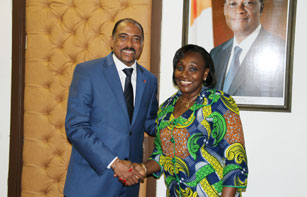
UNAIDS Executive Director, Michel Sidibé and Côte d’Ivoire Prime Minister Daniel Kablan Duncan (right). Credit: UNAIDS/Basil Zoma
UNAIDS Executive Director Michel Sidibé urged the Côte d'Ivoire government to intensify its efforts in the HIV response. Mr Sidibé wrapped up a two-day official visit to the country on 27 March.
Côte d'Ivoire estimates that there were 17 000 new HIV infections in 2011 and it estimates that 3.7% of the population were living with HIV that same year, which is the second highest HIV prevalence in West Africa. Less than 50% of people in need of antiretroviral (ARV) treatment are accessing it.
During a meeting with Prime Minister Daniel Kablan Duncan, Mr Sidibé pointed out that half of all women living with HIV in Côte d'Ivoire have no access to HIV treatment and stressed the need for the government to do more to stop new HIV infections in children.
Mr Sidibé congratulated the government for mobilizing US$ 8 million in additional funding for the HIV response through a tax on tobacco and air travel, but he said the country must still share more of the responsibility for funding its HIV programming. Currently, the country depends on external funding for 90% of its HIV response and has a funding gap of US$ 247 million.
Prime Minister Duncan said that President Alassane Ouattara’s strategy for making health a top national priority includes the main principles for conducting reform of the health sector. He said that his government has been implementing for nearly a year a policy of free health care for pregnant women and children under five years old and that the government intends to introduce universal health coverage this year.

UNAIDS Executive Director Michel Sidibé and Minister of Health of Côte d’Ivoire Raymonde Goudou Coffie.
The Prime Minister acknowledged the need to ensure the availability of essential medicine. Currently 80% of ARVs are imported from outside of Africa, primarily from India. Prime Minister Duncan said that his country had started talks with India on the possibility of producing ARVs in Côte d'Ivoire.
Mr Sidibé also met with the Minister of Health Raymonde Goudou Coffie who said that government had increased 24% of its budget on health and was fully committed to restoring the country’s health system. In talks with the Minister of Justice Gnenema Coulibaly, Mr Sidibé raised his concerns regarding an increase in post-conflict sexual violence following a recent civil war in Côte d'Ivoire and advocated for advancing the implementation of a resolution on ending sexual violence.





